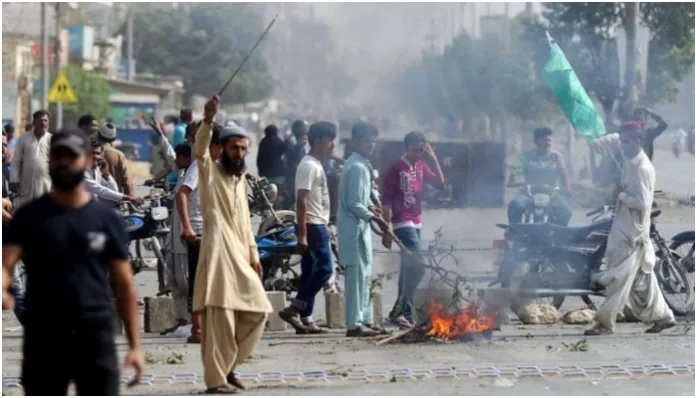Protesters in Quetta, Pakistan, attacked Kharotabad police station with a grenade, demanding that the police hand over a blasphemy suspect to them amid a violent demonstration, Dawn reported.
The mob, demanding the release of a suspect accused of blasphemy, clashed with authorities, leading to a volatile situation. According to Dawn, the protesters’ anger and frustration boiled over, prompting the extreme action.
The police had reportedly detained a suspect and filed a case against him for blasphemy. The Pakistani media outlet reported that demonstrators, affiliated with Tehreek-e Labbaik Pakistan (TLP) and other religious groups, disrupted traffic by setting tyres on fire and held rallies throughout various areas of Balochistan’s capital city.
According to reports, protesters later threw a hand grenade at the Kharotabad police station while demanding that the blasphemy suspect be handed over to them.
The grenade exploded outside the police station but no injuries were reported. A senior police officer stated that an FIR had been filed against the suspect, and he was arrested shortly after the incident was reported, as per Dawn.
Tehreek-e-Labbaik Pakistan (TLP), an Islamist political party founded in 2015, has been central to Pakistan’s contentious blasphemy debates.
The TLP, led by Khadim Hussain Rizvi until his death in 2020, is known for its staunch advocacy for the strict enforcement of blasphemy laws, which are enshrined in Pakistan’s Penal Code.
These laws criminalise acts deemed insulting to Islam and the Prophet Muhammad, with penalties that can include the death sentence.
The TLP gained prominence through high-profile protests, most notably the 2017 Faizabad sit-in, which demanded the resignation of Law Minister Zahid Hamid over a perceived blasphemous change in the oath for lawmakers.
The party has also been involved in violent demonstrations, such as those following the 2018 acquittal of Asia Bibi, a Christian woman who had been on death row for blasphemy charges.
Bibi’s case ignited widespread protests by TLP supporters, who viewed the acquittal as an affront to Islamic values.
Additionally, the 2011 assassination of Punjab Governor Salman Taseer by his bodyguard, Mumtaz Qadri, further highlighted the volatility surrounding blasphemy laws.
Taseer’s murder was directly linked to his criticism of the blasphemy laws and his support for Bibi, with Qadri being hailed as a martyr by extremist factions, including the TLP.
The issue of blasphemy in Pakistan is a deeply contentious and volatile subject. Critics argue that blasphemy laws often target religious minorities and are used to settle personal grievances, leading to a climate of fear and intolerance.
Human Rights Watch and other organisations have documented numerous instances of extrajudicial violence and wrongful convictions tied to these laws.

